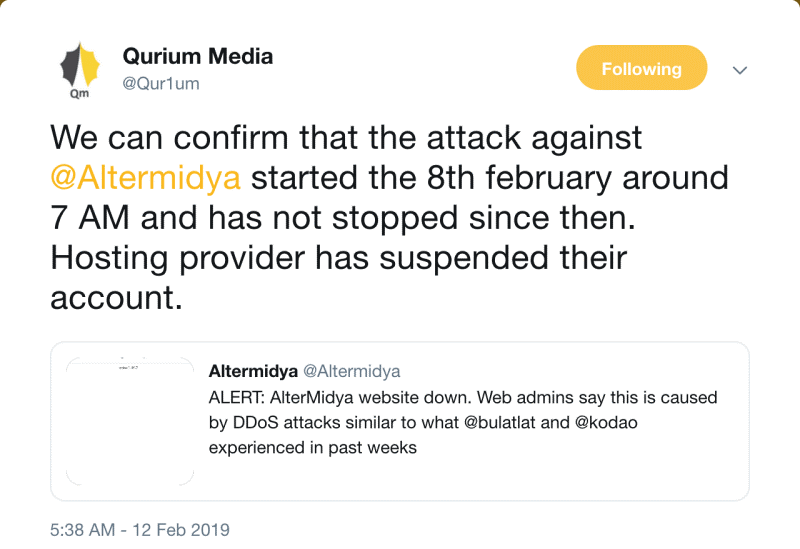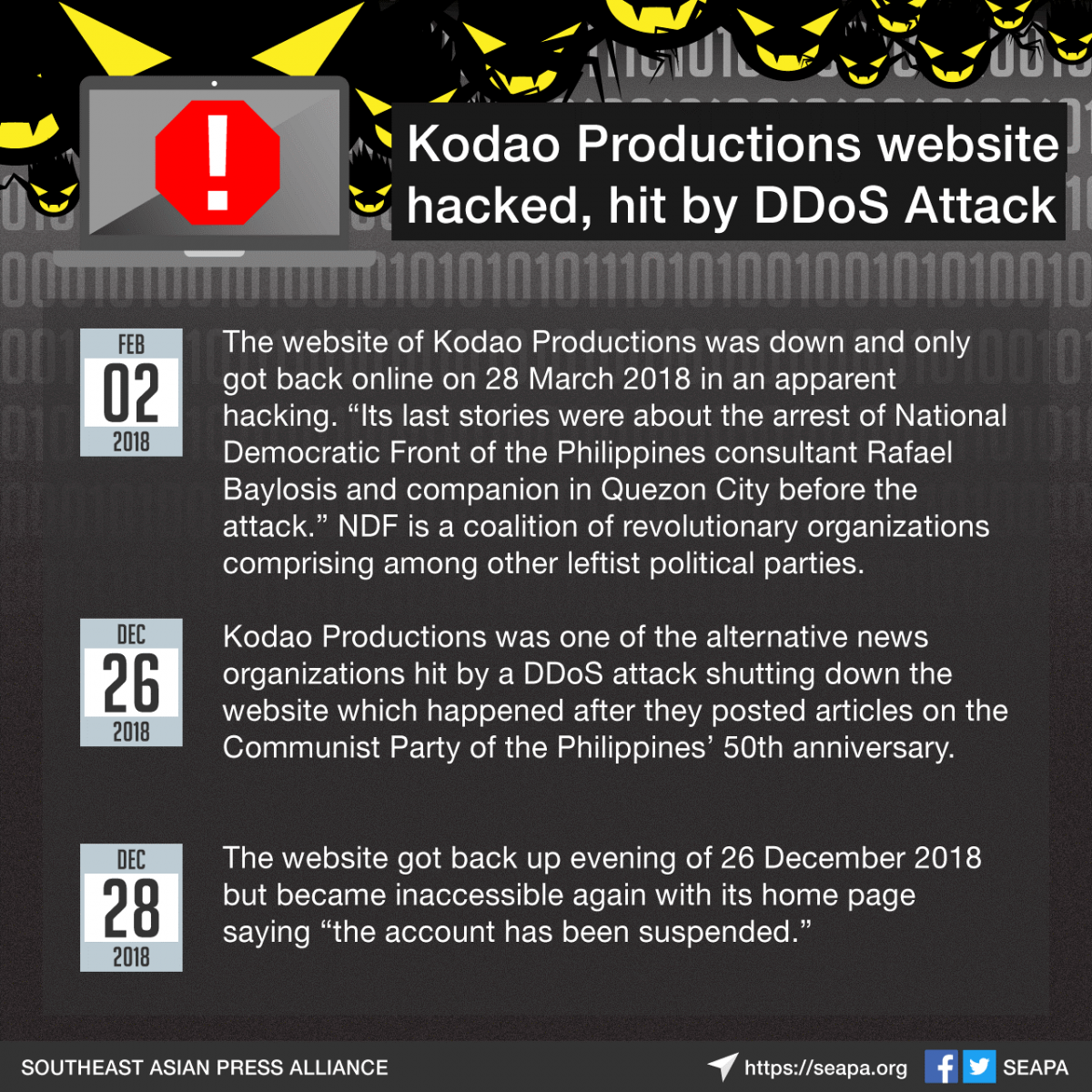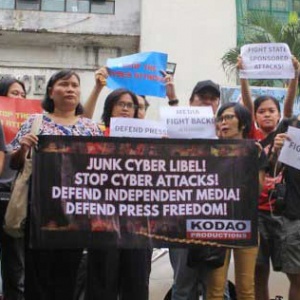IT companies challenged over cyber-attacks
A potentially ground-breaking case over cyber-attacks against alternative online media has been launched in the Philippines.
Janess Ann J. Ellao in Manilla reports that the case is over one of the largest denial of service attacks seen in any country.
Four alternative media sites, Bulatlat, Pinoy Weekly, Kodao Productions, and Altermidya – People’s Alternative Media Network have filed a civil claim for damages against two IT companies, IP Converge and the Suniway group of companies Inc. They are being assisted by human rights lawyers from the National Union of Peoples’ Lawyers (NUPL).
20 media outlets were the subject of an intense series of what NUPL called well funded and orchestreated cyber-attacks, known as distributed denial of service attacks (DDoS) between December 2018 and March this year.
 The common thread between the online media outlets was that they had all reported stories critical of the government of Rodrigo Duterte immediately before their sites were repeatedly made unavailable. DDoS attacks flood websites with an unusual volume of traffic, overwhelming capacity until websites can no longer be accessed. For a detailed explanation see Electronic Frontier Foundation.
The common thread between the online media outlets was that they had all reported stories critical of the government of Rodrigo Duterte immediately before their sites were repeatedly made unavailable. DDoS attacks flood websites with an unusual volume of traffic, overwhelming capacity until websites can no longer be accessed. For a detailed explanation see Electronic Frontier Foundation.
However, a government spokesman denied involvement.
“I’m telling you as a matter of fact, we are not in the business of doing cyberattacks.” Presidential Task Force on Media Security Executive Director and Undersecretary Joel Sy Egco said in a phone message to Business World.
However, President Rodrigo Duterte himself and his administration have a history of attacking the Philippines media, particulalry reporters or outlets which have been critical of the government.
|
by Dr Fiona Martin, Sydney, Australia The political use of DDoS attacks has increased since 2010, when Harvard researchers reported their widespread use in attempts to silence independent media worldwide The 2017 Freedom House internet report says the low cost of cyberattack tools and weakly regulated markets have “enabled not only central governments, but also local government officials and law enforcement agencies to obtain and employ them against their perceived foes, including those who expose corruption and abuse”. During 2017 cyberattacks took media websites offline in 18 countries. Last year, the annual Freedom on the Net report noted Philippines media outlet the Vera Files was hit by a DDoS attack after it published a story about President Rodrigo Duterte and his daughter, Davao city mayor Sarah Duterte, failing to properly disclose significant joint assets at the Bank of Philippine Islands. Vera Files was one of the 20 sites subjected to the DDos attacks. However, this latest legal action against IP Converge and the Suniway group appears to be the first time internationally that independent media outlets have taken IT firms to court for their part in enabling DDoS events. |
|---|
Social media has become weaponized under the current administration – so-called “patriotic trolling” has become the norm in the Philippine social media landscape. In a Bloomberg Businessweek report, What happens when the government uses Facebook as a weapon? such trolling is described as “use of targeted harassments and propaganda meant to go viral and to give the impression that there is a groundswell of organic support for the government.”
A forensic report by the Sweden-based NGO, Qurium Media Foundation found Suniway’s infrastructure (it leased IP addresses from IP Converge) was a one of the largest DDoS attacks it had ever seen (Qurium, which hosted many of the target sites, was also attacked).
“Qurium has assisted independent media against DDoS attacks for the past decade, and they have never seen such magnitude and scale of Distributed Denial of Service (DDoS) attacks launched in one single country.”
Quezon City Trial Court Branch 220 under Judge Jose Paneda has now received at least 3,500 pages of printed web logs with signature attacks. The court has also received monitoring reports of the distributed denial of service (DDoS) attacks, forensic reports, and abuse reports submitted by CIVICERT, an international computer emergency response team for civil society groups.
In its reply to the filed complaint, IP Converge admitted leasing 64 IP addresses to Suniway. It has made cross-claims against Suniway, saying that the latter should “alone bear the consequences” as it has complete control over the leased IP addresses.“Suniway should be held liable for all the damages and expenses caused to IP Converge as a result of this case, and for whatever amount may be adjudged against IP Converge by virtue of the complaint” IP Converge further stated.
In a press statement, Rhea Padilla of Altermidya said the two IT companies denied having direct knowledge over the cyber-attacks despite the magnitude and intensity of the attacks. She said that both companies cannot simply feign ignorance over the cyber-attacks.
“IP Converge did not reply to any of the emails about the DDoS attacks emanating from its infrastructure. IP Converge said the recipients may have missed the emails because they receive hundreds of emails in any given day.”
At this stage Suniway, has not squarely answered the primary claim that the IP addresses were traced to their infrastructure.
Both companies, meanwhile, have filed counter-claims for “besmirching their reputation
IP Converge demanded on its reply P1 million from each plaintiff for moral damages, P1 million each for exemplary damages and P1.5 million for attorney’s fees and cost of litigation. Suniway is claiming P2 million for moral damages, P500,000 for exemplary damages and P500,000 for attorney’s fees at cost of litigation. In sum, both companies are claiming a total of P12.5 million.
“We view this as a form of intimidation given that all the plaintiffs are non-profit media outfits,” Padilla said.
“We firmly believe that legitimately exercising a right and seeking appropriate redress at the proper forum when that right is violated can never be penalized or begrudged.”
 Jola Mamangun, from Kodao productrions who is also the President of IAWRT Philippines, said this counter move is part of the continuing attacks on press freedom in the country.
Jola Mamangun, from Kodao productrions who is also the President of IAWRT Philippines, said this counter move is part of the continuing attacks on press freedom in the country.
The cyber-attacks against the four alternative news sites stopped rather abruptly, following the filing of the civil complaints before the Philippine court on March 29, the anniversary of the first internet connection in the Philippines.
Janess writes for Bulatlat and is a member of IAWRT-Philippines https://www.bulatlat.com
Further Sources
Yet Another Year of Living Dangerously
Editorial: Resist cyber-impunity
Qurium Disclosing Company that Facilitated Cyber-attacks
Philippines Digital Reality Bites – Alternative Media in the Crosshairs








